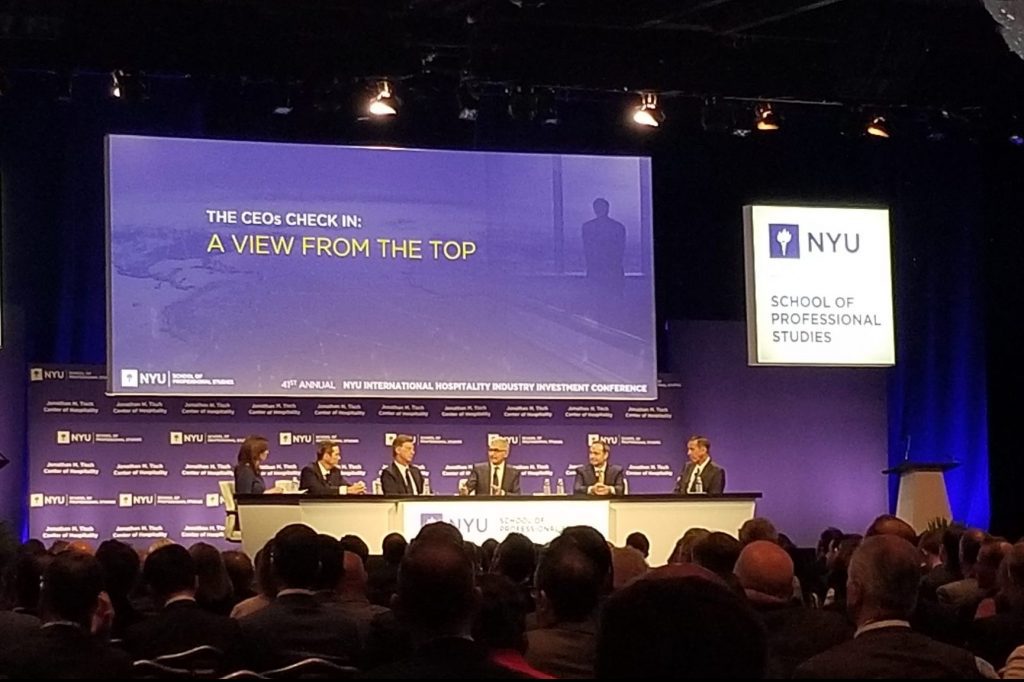Skift Take
It used to be that hotel CEOs outright dismissed homesharing. But now that more hospitality companies are taking the plunge, the top brass is making the case for why the hotel giants can do it better.
Hoteliers for years watched the niche homesharing market grow from afar, observing that lodging offered to customers was predominantly illegal and offered little assurance of a quality guest experience.
But as the homesharing accommodations grow in popularity, hotel chains now think they can do it better than established players.
One reason is “we are not permitted to stand away from the business,” Marriott CEO Arne Sorenson said during a panel discussion at the 2019 NYU Hospitality Industry Investment Conference in New York — adding that homesharing companies normally outsource the quality of a stay to hosts and renters, thereby absolving them of any blame when something goes wrong.
When Marriott Homes & Villas launched in April, the hotel group cemented itself as a main competitor of Expedia-owned HomeAway and Airbnb, which recently acquired HotelTonight in its own bid to enter the traditional hotel market.
During Marriott’s pilot testing for its home rental product in London last year, the chain drove more guests for property managers on listings that were also featured on Airbnb and Booking.com thanks to its loyalty program, Sorenson said.
“The managers to us are like franchisees, and they are connecting with us,” he added . “Getting more properties depends on the business we drive to them.”
Each of Marriott’s rentals are managed by a third party, similar to U.S. hotel group Choice Hotels, which entered the homesharing space three years ago. Vacation Rentals by Choice Hotels now offers more than 30,000 properties across dozens of U.S. destinations, according to its website.
“The regulations and tax laws can differ from beach town to beach town, so it’s helpful to have that local knowledge,” said CEO Patrick Pacious, who later echoed Sorenson’s sentiments on the power loyalty programs hold with customers.
Faith in China’s Economy
Trade tensions between the U.S. and China may be having a damaging impact on both countries economies, but panelists seemed optimistic about growth opportunities in China long term — pointing to the development of Shanghai over the past decade as a tourist destination.
The key challenge for hoteliers is that, similar to U.S. and European markets, local Chinese groups are expected to dominate real estate in the country, said Accor CEO Sebastien Bazin. A significant amount of real estate in China today is also state owned, putting the onus on companies to find the right partners to build with.
“It’s fine to accept it and penetrate the market with them. They are too powerful for us to beat,” Bazin said.
As China shifts from solely lower midscale offerings to more luxury brands, it’s also feasible aforementioned state-owned companies will control 70 percent of the luxury market in China, he added.
On the U.S. side of the spectrum, panelists argued the political standoff has put a strain on inbound tourism. Visits from Chinese tourists to the U.S. specifically dropped 5.7 percent in 2018, according to Hyatt CEO Mark Hoplamazian. But a greater concern to inbound tourism is the strengthening U.S. dollar.
“Currency matters and the U.S. dollar continues to be very strong,” said Hoplamazian. “We have a structural barrier where we will be fighting against a strong currency for a relatively long period of time.”
Before the introduction of Brand USA in 2010, the U.S, additionally did not have an organized way to promote it as a destination, he concluded.
Have a confidential tip for Skift? Get in touch
Tags: accor, choice hotels, homesharing, marriott
Photo credit: The CEOs of Hyatt, Marriott, IHG, Choice Hotels, and Accor onstage at the NYU hospitality conference. Skift
